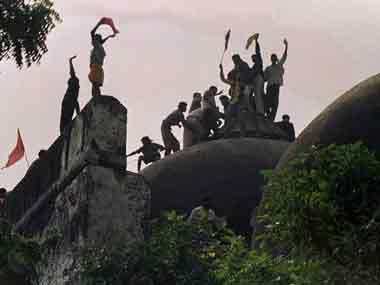The hearing in the Ayodhya dispute in the Supreme Court continued for the 38th day on Monday, and proceedings were marked by Muslim parties arguing that they had been in possession of the disputed site throughout. The hearing in the case took place even as Section 144 of the CrPC , banning the assembly of four or more people, has been imposed in Ayodhya district and surrounding areas in Uttar Pradesh till 10 December, in anticipation of the judgment in the case. Rajeev Dhavan, who represents lead petitioner M Siddiq and the All India Sunni Waqf Board, told the five-judge constitution bench hearing the case, “We have been in possession throughout. There is nothing to suggest or show that the plaintiff (Nirmohi Akahara and others) are the proprietors of the disputed land in question.” The counsel said that there is no proof by the Archaeological Survey of India (ASI) to ascertain that a temple was destroyed to build the mosque at the impugned site. “They (Hindu parties) claimed adverse possession since 1934, for which there is no proof,” Dhavan contended. [caption id=“attachment_5686431” align=“alignleft” width=“380”]  A file photo of kar sevaks demolishing Babri Masjid in 1992. AFP[/caption] Justice DY Chandrachud reportedly told Dhavan: “Documents post 1858 show that a Ram Chabutra was set up, and possession had been with them.” To this, Dhavan argued that Hindus did not have possession, but only had the right to pray. He contended, “If somebody asks me if they can wash their hands on my land, and I agree, it will mature to a prescriptive right and nothing more.” Dhavan further argued and said, “If Hindu parties already had the title, why did they knock down one of the domes of the Babri Masjid in the 1934 riots and trespass to install the idols of Lord Ram in 1949?” According to News18, Dhavan also exhorted the court not to go into the legitimacy of Babur’s actions. “If Babur gets involved, Ashoka’s action will also be judged. This court never trod this path in the past.” He argued that the court cannot examine now whether Babur or Mir Banki (Mughal commander who is said to have founded the Babri Masjid) acted contrary to Islam, adding that it is only necessary to examine the law of Waqf properties. He also responded to claims that Babur had violated Islamic law by saying, “All that they have done is pick up something from Quran and make an argument. Islamic law and practice is much more than that.” He subsequently said, “Islamic law has evolved over 15 centuries, we cannot pick and choose from Quran and Hadith to say ‘you are acting against Quran’.” One of the demands of the Muslim side is the restoration of the situation at Ayodhya to 5 December, 1992 — a day before the demolition of the Babri Masjid. Referring to this, Dhavan said, “We can’t keep pretending that December 1992 did not happen.”
Only Muslim parties were asked questions, not the Hindu side, SC told
Muslim parties also alleged before the Supreme Court that questions have been asked only to them and not posed to the Hindu side in the politically sensitive case. “Your Lordship didn’t ask a question to the other side. All the questions have been asked to us only. Of course, we are answering them.” Dhavan told the bench. The submission was vehemently opposed by senior advocate C S Vaidyanathan, representing deity ‘Ram Lalla’, who said: “This is totally unwarranted”. Dhavan’s remark came when the bench, which comprises Chief Justice Ranjan Gogoi, Justices SA Bobde, DY Chandrachud, Ashok Bhushan and SA Nazeer, said that the idea behind erecting iron railing at the disputed site was to separate the inner courtyard from the outer courtyard. By putting up an iron railing, the idea was to separate Hindus and Muslims and it was to appreciate the fact that Hindus were offering prayers in the outer-courtyard where ‘Ram Chabutra’, ‘Sita Rasoi’, ‘Bhandar Grih’ were situated, the court said. The Constitution Bench of the Supreme Court has been hearing appeals challenging the 2010 Allahabad High Court verdict which ordered equal division of the 2.77-acre disputed land in Ayodhya among the Sunni Waqf Board, the Nirmohi Akhara and Ram Lalla. The 16th-century Babri Masjid was demolished on 6 December, 1992. The top court had recently said that it would wrap up hearing the case on 17 October, a day earlier than it was scheduled to, thus leaving merely three days of active hearing now. The judgment on the same will be passed on 4-5 November. With inputs from agencies


)

)
)
)
)
)
)
)
)



